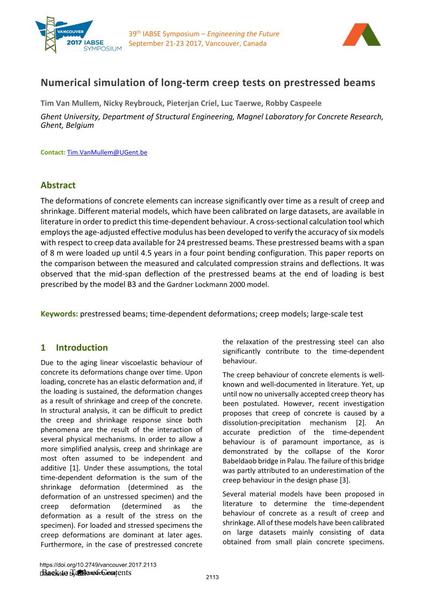Numerical simulation of long-term creep tests on prestressed beams

|
|
|||||||||||
Bibliografische Angaben
| Autor(en): |
Tim Van Mullem
(Ghent University, Department of Structural Engineering, Magnel Laboratory for Concrete Research, Ghent, Belgium)
Nicky Reybrouck (Ghent University, Department of Structural Engineering, Magnel Laboratory for Concrete Research, Ghent, Belgium) Pieterjan Criel (Ghent University, Department of Structural Engineering, Magnel Laboratory for Concrete Research, Ghent, Belgium) Luc Taerwe (Ghent University, Department of Structural Engineering, Magnel Laboratory for Concrete Research, Ghent, Belgium) Robby Caspeele |
||||
|---|---|---|---|---|---|
| Medium: | Tagungsbeitrag | ||||
| Sprache(n): | Englisch | ||||
| Tagung: | IABSE Symposium: Engineering the Future, Vancouver, Canada, 21-23 September 2017 | ||||
| Veröffentlicht in: | IABSE Symposium Vancouver 2017 | ||||
|
|||||
| Seite(n): | 2113-2119 | ||||
| Anzahl der Seiten (im PDF): | 7 | ||||
| Jahr: | 2017 | ||||
| DOI: | 10.2749/vancouver.2017.2113 | ||||
| Abstrakt: |
The deformations of concrete elements can increase significantly over time as a result of creep and shrinkage. Different material models, which have been calibrated on large datasets, are available in literature in order to predict this time-dependent behaviour. A cross-sectional calculation tool which employs the age-adjusted effective modulus has been developed to verify the accuracy of six models with respect to creep data available for 24 prestressed beams. These prestressed beams with a span of 8 m were loaded up until 4.5 years in a four point bending configuration. This paper reports on the comparison between the measured and calculated compression strains and deflections. It was observed that the mid-span deflection of the prestressed beams at the end of loading is best prescribed by the model B3 and the Gardner Lockmann 2000 model. |
||||
